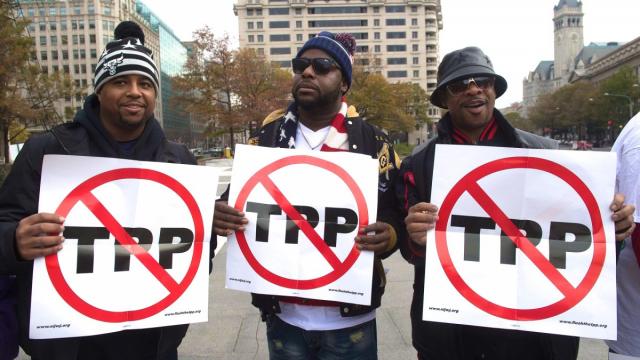
The reports are rolling in: the Trans-Pacific Partnership (TPP) is dead. If you read the obituaries, most news outlets seem to agree that the cause of death was simple: the election of Donald Trump, who railed against the deal during his campaign. But the pundits have the story wrong.
The real story is that an unprecedented, international uprising of people from across the political spectrum took on some of the most powerful institutions in the world, and won.
Sure, Donald Trump's – and Bernie Sanders’ – campaign focus on the TPP elevated U.S. awareness about the pact, a wide-reaching international agreement negotiated by the Obama administration. But no single politician killed this deal.
If not for the constant pressure from activists and civil society groups, the TPP would have become law long before the recent U.S. election. But thanks to intense, creative and strategic organizing from the day the text was finalized in 2015, there was never a majority of support for the pact in Congress. That’s why it was never implemented.
The TPP is a massive global deal that was negotiated in secret with hundreds of corporate advisers given special access while the public was locked out. It would have handed multinational corporations like Walmart, AT&T and Monsanto extraordinary new powers over everything from the wages we earn, to the way we use the internet, to the safety of the food we feed our children.
Perhaps most shockingly, the TPP would have allowed corporations to sue governments before tribunals of three corporate lawyers, essentially creating an unaccountable, shadow legal system outside of our traditional courts to punish governments that pass laws that corporations don’t like.
A simple agreement to lower tariffs and other anticompetitive barriers to trade wouldn’t have been so controversial. But big business couldn’t resist the urge to abuse the extreme secrecy surrounding the TPP negotiations to stuff the pact with a wishlist for policies they knew they could never pass through traditional means.
That unchecked greed was the TPP’s demise. What emerged from the closed-door negotiations was more than 5,000 pages of policy so clearly against the public interest that it awakened a firestorm of opposition that swept the globe, and in the end, sent the TPP to its grave.
While negotiations were still under way, tens of thousands of people joined mass protests in Japan, Peru, Australia, New Zealand and other Pacific Rim nations. They pushed back on the TPP’s worst provisions, held their leaders’ feet to the fire and dragged the talks out for years. This early wave of international resistance changed the game: it bought time for activists to organize an effective opposition in the US, which was seen as all-important in the global calculus of the Washington-led deal. If Congress did not ratify the TPP, it would die.
In the meantime, an unlikely alliance was forming. Activists, farmers, labor unions, tech companies, environmentalists, economists, nurses, LGBTQ advocates, libertarians and librarians mounted an intense opposition to the “fast track” legislation that the White House needed to rush the final agreement through Congress. The coalition that formed grew from dozens, to hundreds, to literally thousands of organizations, many working together for the first time, ranging from Black Lives Matter to Doctors Without Borders to the Tea Party.
We marched in the streets. We rallied outside the hotels and resorts that hosted the secret negotiations. Cancer patients protesting about the TPP’s impact on healthcare access engaged in civil disobedience and were arrested. Internet freedom activists mobilized thousands of websites for online protests that bombarded lawmakers with emails and phone calls. Academics picked apart leaked versions of the deal, and coordinated with advocates to launch a campaign to educate the public on its flaws.
Hard-hitting activism and public outcry slowed the TPP down, and as a result, dragged it fully into the spotlight just as the US headed into a contentious election season.
It wasn’t a coincidence that Donald Trump saw the TPP as a useful stump speech talking point. Widespread suffering caused by previous trade deals laid a strong foundation for skepticism, making President Obama’s devotion to the Wall Street-friendly deal, and Hillary Clinton’s previous support for it, a huge liability for the Democratic party. As more and more people learned about what the TPP really meant for them and their families, it became politically toxic, to the point that no major party candidate for president could openly support it.
This was a sign that the TPP was on its deathbed, but with the threat of a last-minute push during the “lame duck” session after the election, we needed to be sure. So we targeted undecided lawmakers with protests and flew inflatable blimps outside their offices. We harnessed the power of music to draw huge crowds across the country to “Rock Against the TPP” concerts and teach-ins, taking our opposition to the TPP into the cultural mainstream. We tuned out the chorus of voices that told us that corporate power would always prevail in the end. And finally, we claimed our victory.
Now more than ever, it’s crucial that Americans understand how the TPP was really defeated. An organized and educated public can take on concentrated wealth and power and win. With four years of new battles ahead of us, this is a story we must commit to memory, and a lesson we must take to heart.
3 WAYS TO SHOW YOUR SUPPORT
- Log in to post comments













